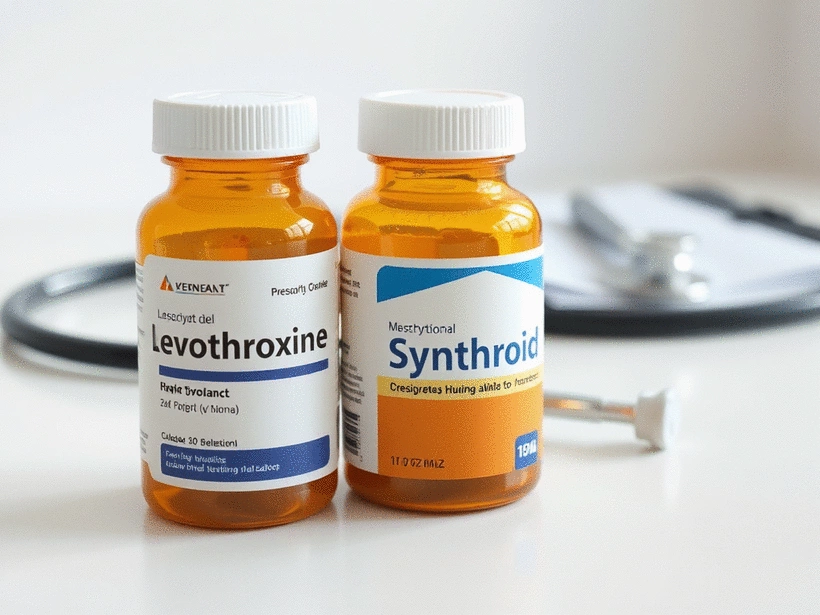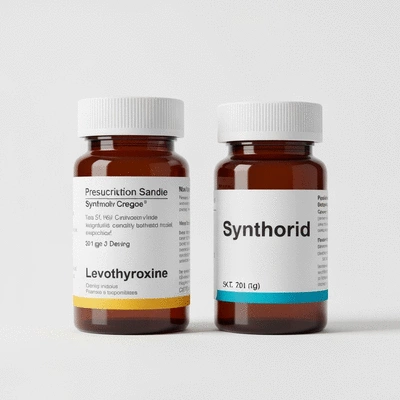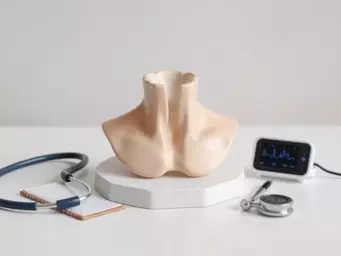Levothyroxine and Synthroid Explained

Have you ever felt fatigued without knowing why? This could be a sign of hypothyroidism, a condition that affects many people unknowingly. Understanding the medications available, like Levothyroxine and Synthroid, is vital for effective management. Let’s explore the essential insights to empower your health journey.
What You Will Learn
- Levothyroxine and Synthroid are both effective treatments for hypothyroidism, sharing the same active ingredient but differing in formulations.
- Formulations vary, including tablets, capsules, and injectables, allowing for tailored treatment based on individual needs.
- Understanding the role of thyroid hormones is crucial, as they regulate metabolism, energy levels, and overall bodily functions.
- Consulting with healthcare providers is essential for personalized medication plans and to discuss any side effects or concerns.
Levothyroxine vs. Synthroid: Key Differences & Similarities
This visual highlights the distinctions and commonalities between Levothyroxine (generic) and Synthroid (brand-name) for hypothyroidism management.
Key Similarity: Active Ingredient
Both Levothyroxine and Synthroid share the exact same active ingredient: Levothyroxine Sodium. This synthetic hormone mimics natural T4, crucial for metabolism.
Levothyroxine (Generic)
- More Affordable: Generally lower cost.
- Bioequivalence: Must meet FDA standards, but inactive ingredients can vary.
- Availability: Widely available across pharmacies.
Synthroid (Brand-Name)
- Consistent Formulation: Known for strict manufacturing standards.
- Extensive Testing: Backed by years of research and clinical use.
- Higher Cost: Typically more expensive.
Understanding Levothyroxine and Synthroid: The Basics
When it comes to managing hypothyroidism, understanding your medication options is crucial. Two common names that often come up are Levothyroxine and Synthroid. These medications play a vital role in restoring thyroid hormone levels, but what exactly are they, and how do they work? Let's break down the basics!
What Are Levothyroxine and Synthroid?
Levothyroxine is the generic name for a medication used to treat hypothyroidism, while Synthroid is a brand-name version of the same drug. Both are synthetically produced thyroid hormones that help regulate your body’s metabolism and energy levels. It’s important to note that while Synthroid and Levothyroxine have the same active ingredient—levothyroxine sodium—there may be differences in inactive ingredients and formulation that can affect how your body absorbs them. Research published in PMC NCBI highlights the importance of consistent formulations in thyroid hormone replacement therapy.
- Levothyroxine: The generic, often more affordable option.
- Synthroid: The brand-name version, known for its extensive testing.
- Both aim to provide the necessary thyroid hormone to improve symptoms of hypothyroidism.
As a patient, you might wonder which option is best for you. I always recommend discussing your unique needs and preferences with your healthcare provider to determine if the generic or brand-name medication aligns best with your treatment plan.
Active Ingredient and Formulations
The active ingredient in both Levothyroxine and Synthroid is levothyroxine sodium. This synthetic hormone mimics natural thyroxine (T4) produced by the thyroid gland. You might be curious about how these medications come in different formulations. They can be found in various doses, allowing personalization based on individual needs. Formulations can include:
- Tablets: The most common form, easy to take.
- Capsules: Another option for those who prefer this method.
- Injectables: Less common, typically used in specific medical conditions.
When starting treatment, it’s essential to follow your doctor's guidance on the appropriate formulation and dosage. This ensures you receive the correct amount of thyroid hormone needed for optimal health.

Overview of Thyroid Hormone and Its Role in the Body
Your thyroid gland, located in the neck, produces hormones that regulate numerous bodily functions. These hormones, primarily T4 and T3, are crucial for managing metabolism, energy levels, and even body temperature. When your thyroid is underactive, as is the case with hypothyroidism, the body's processes can slow down. The Journal of Clinical Endocrinology & Metabolism provides in-depth information on the critical role of thyroid hormones in maintaining overall health.
- Regulates metabolism: Affects how your body uses energy.
- Supports growth and development: Essential for overall health.
- Influences mood and cognitive function: Affects mental health and clarity.
Understanding the significance of these hormones can empower you to manage your condition more effectively. At Thyroid Health Hub, we are dedicated to providing the resources you need to navigate your thyroid health confidently!
Interactive Poll: Your Experience Matters!
Have you made a choice between Levothyroxine and Synthroid? We want to hear about your experience! Please share your preference and why in the comments below:
Frequently Asked Questions (FAQs)
Q1: What is the main difference between Levothyroxine and Synthroid?
A1: The main difference is that Levothyroxine is the generic name for the medication, while Synthroid is a brand-name version. Both contain the same active ingredient, levothyroxine sodium, but may differ in inactive ingredients and formulation.
Q2: Are Levothyroxine and Synthroid equally effective?
A2: Yes, both medications are generally considered equally effective as they contain the same active ingredient. However, individual responses can vary due to differences in inactive ingredients and how the body absorbs them.
Q3: Can I switch between generic Levothyroxine and brand-name Synthroid?
A3: While they are bioequivalent, it's crucial to consult your healthcare provider before switching. Some patients may experience subtle differences due to inactive ingredients, and consistent medication is often recommended for thyroid treatment.
Q4: What are the different forms of Levothyroxine and Synthroid?
A4: Both medications are primarily available in tablet form. Some generic formulations may also come in capsules, and injectables are available for specific medical conditions, though less common for daily use.
Q5: Why is it important to monitor symptoms when taking thyroid medication?
A5: Monitoring symptoms is vital because individual responses to thyroid medication can vary. Actively tracking your symptoms helps your healthcare provider adjust your dosage or formulation to ensure optimal treatment and minimize side effects.
Summarizing Key Insights on Levothyroxine and Synthroid
When it comes to choosing between Levothyroxine and Synthroid, making an informed decision is crucial. Both medications aim to manage hypothyroidism effectively, but there are important nuances to consider. Understanding these differences can help you navigate your treatment options confidently. Here are some key insights to keep in mind:
- Both medications are thyroid hormone replacements but may vary slightly in their formulations.
- Bioequivalence indicates that they are generally interchangeable, though individual responses may differ. The JAMA Internal Medicine journal offers further insights into the clinical implications of generic levothyroxine.
- Real-world effectiveness can depend on personal health factors, including how your body metabolizes the medication.
As you weigh your options, remember that your response to thyroid treatment can be unique. That’s why it’s essential to monitor your symptoms actively and communicate any changes to your healthcare provider.

Making an Informed Decision: What You Should Know
Before making any changes to your thyroid medication, it’s important to gather as much information as possible. Consider the following:
- Understand the differences in active ingredients and formulations.
- Evaluate your past experiences with thyroid medications.
- Keep abreast of any new research or guidelines regarding thyroid treatment.
At Thyroid Health Hub, we strive to provide accurate and accessible information about hypothyroidism and its management. This ensures you feel empowered to take charge of your health journey!
Consulting Healthcare Professionals for Personalized Advice
Consulting with your healthcare provider is a vital step in managing your thyroid health. They can help you navigate the complexities of medication options and tailor a plan that suits your individual needs. Here’s how you can prepare for your appointment:
- Bring a list of your current medications and any side effects you’ve experienced.
- Discuss your lifestyle, diet, and any recent changes in your health.
- Ask specific questions regarding the differences between Levothyroxine and Synthroid.
Remember, your healthcare provider is your partner in health. Don’t hesitate to reach out to them with any concerns or questions!
Understanding Symptoms of Hypothyroidism and Their Management
To effectively manage your condition, it's essential to understand the symptoms of hypothyroidism. Common signs include:
- Fatigue and low energy levels
- Weight gain or difficulty losing weight
- Cold intolerance and dry skin
- Depression or mood changes
Recognizing these symptoms can empower you to seek timely treatment and adjustments to your medication. As Dr. Clara Hastings, I often emphasize the importance of being proactive in your health journey!
Recap of Key Points
Here is a quick recap of the important points discussed in the article:
- Levothyroxine is the generic name, while Synthroid is the brand-name version, both containing the same active ingredient.
- Different formulations (tablets, capsules, injectables) allow for personalized treatment based on individual needs.
- Thyroid hormones regulate metabolism, growth, mood, and cognitive function, making them essential for overall health.
- Both medications are generally bioequivalent but individual responses may vary, making it important to monitor your symptoms.
- Consulting with healthcare professionals is crucial for tailored advice and effective management of hypothyroidism.









